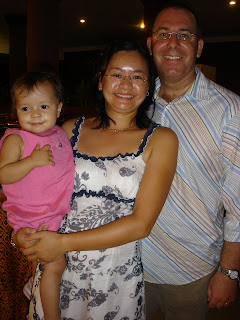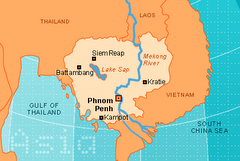Anyway - we're both going well...keeping very busy and on the whole really satisfied with progress and where we're at in our work here. There are occasional moments where we are hanging out to go home - but fortunately these are getting fewer and far between than we we first arrived. Lately - our focus has been on the church sustainability forums and assessing options for setting up an NGO here and looking at potential social justice projects. An update on the forums will be posted shortly - so stay tuned for this!
Regarding the NGO - it is quite a process for setting up and registering with the various Government departments - each wanting their own little "fee" for their approval services. Interesting process so we've been told...we will fill you on how it pans out as we take the journey with all this!
Since our last update in April, here's a few things that have happened:
We nearly forgot Easter as it's not celebrated here, it being primarily a Buddhist nation - not even chocolate easter eggs or hot cross buns! However, we did end up going to one of the international churches on Easter Sunday to help us reflect on what Easter is all about. The weekend after Easter was then nearly a week off for most Khmers to celebrate the Khmer New Year public holiday, where most people head back to their homes in the province (most people come to the city to seek work but are originally from the provinces). All the markets and many places are closed over this period of time, so it was relatively quiet here in the city, which I (Jo) immensely enjoyed (particularly being able to sleep without being woken by constant noise)!
We also attended the ANZAC Day memorial dawn service at the Australian Ambassador's house (see pics below). After much deliberation, we decided to hire Yaan, an older Khmer woman to help us clean our place once a week. Whilst it is a very common practice to have home help with cooking and cleaning amongst expats and the more wealthy Khmers, Mark and I did not even contemplate this until we realised that because of the dirt and the dust from the streets, etc, you nearly need to clean every day. This was becoming more and more exhausting as we were getting more busy with our work here (not to mention sweating like a pig just mopping the floor)! We continue to do our own shopping and cooking, washing, etc and just some lighter cleaning duties.
We also went to a 'Timothy's All Project" pastor's retreat down in Sihanoukville (~4+hrs in a bus) that we were invited along to. This project is centred on a mentoring program for senior leadership of the main khmer church denominations here. It provided an interesting time to observe the pastors interact with each other as well joining in with some of the practical teaching. It was also really enjoying spending some time getting to know the pastor's families - as the retreat included pastors plus their wives and children. It definitely became memorable on the long bus trip back when a microphone was passed around the bus allowing Khmer hymns to be belted out by the pastors and their wives! Khmers love karaoke and singing their hearts out - bless their souls!
May and the start of June was personally a time of celebrations for us both. We celebrated our 4th wedding anniversary (with a surprise trip to Bangkok for a couple of days organised by Mark), Mark's birthday in late May and then my (Jo's) birthday in early June. (Not to mention Mother's Day back home and it was my mum's birthday as well.) Such wonderful occassions here take an extra special effort to plan as again Cambodians do not celebrate anniversaries or birthdays (if they do - it is usually for the more "western" khmers and even then - mainly for the young children) - partly because they can't afford it and some of them don't have details of their actual birth dates.
Some good news is we just bought a car recently - a little VW Golf, about 15 years old and who knows how many owners!. It is definitely not original like most vehicles around Phnom Penh - but at was cheap and should be reliable (so we're told!). So, we are happy about this and it was a real answer to prayer considering we're heading into the wet season right now and have already been caught out on the motorbike a number of times - which can be pretty dangerous to say the least! (it is a case of "every man for himself" usually - let alone during the madness of peak hour traffic in pelting rain). So, having the ability to get around town in a car will be a safe and better option for our transport needs. It was funny though, when a couple of weeks ago we used the car to go to a cambodian wedding reception we were invited to and it rained very heavily causing some significant flooding in most of the inner city areas and in particular in the area near the reception venue. We were amazed that our little VW actually made it through the deluge - considering the water depth was at least 1 1/2 foot in sections...amazingly the car didn't miss a beat, and didn't float away (..we have heard stories of this happening in PP not so long ago actually!). We were praying intently though...as the prospect of push starting in the rain and with the roads so flooded - was not something we were looking forward to! (at least for Jo - as she was in her nice dress on the way to the wedding reception!!).
Aside from this - we do have another team coming next week which will be great! We are really looking forward to seeing some of our church friends again. This trip is focused on assessing some potential social justice projects that our church can commit to undertake - so it will be great to see how this unfolds and hopefully we can start getting a little more clarity around this particular area of what we're doing in Cambodia. In spite of a large number of NGO and local/international government efforts in place currently (over 800+) - there is still significant needs here in terms of improving the quality of life for the many poor and marginalised in cambodian society.
Well...that's about it from us! Below are some interesting photos of our recent journey. Enjoy!

Pic of us both on the road with the motorbike (Jo is now confident in riding - though still getting used to traffic)
Typical daily traffic scene - can they honestly expect to fit anymore in that van!!
Outdoor activities at the beach in Sihanoukville - as part of "Timothy's All Project" cambodian pastors retreat
Mark posing with the elephant and Ps. Toun Kakada

Group photo at the end of the pastors retreat in Sihanoukville (we're the ones on the left of frame!)

Pic taken while out on one of our morning runs around the Olympic Stadium (...don't be fooled - we are not that fit and unfortunately going for a run is less frequent than we'd like!)- shows a local youths basketball team drill
At the ANZAC Day ceremony in Phnom Penh...it was really great to be involved and good to see it was so well supported by the local Aussies

...Ahh...a touch of Australiana! a friendly game of 2-up on ANZAC day

Our man Heng, going for the big bite on a local fried spider (famous in the township of Skoun, about 1 hr from PP)
...and yes...he is for real.!!
..nice touch...just the leg dangling out of the mouth: Perfect!!
A happy little camper! ...
Our joint response to the spider eating incident....(we won't be in a hurry to try that one!!)
Our landlady doing her daily cooking - using a traditional khmer clay oven (this is used by most cambodians - even in the city!)
Relaxing with some friends on the beach at Sihanoukville (on the King's Birthday holiday weekend)
Jo surprised Mark with a huge birthday cake during the May Forum. Very nice!!
Wet season is here!! ..this pic was taken out front of a wedding reception venue..our little VW Golf got us to the venue reasonably on time and most importantly without floating down the road!
Pic of Jo beside a line of guests at a traditional khmer wedding ceremony. Guests are asked to carry the packs of fruit or other food items in a procession to the ceremony entrance. They are then taken and placed on the floor where the bridal party sit. The bride and groom then give the fruit and other items to the parents and relatives as a way to honor them throughout the wedding ceremony. (The fruit carrying ceremony usually starts at 6am in the morning mind you!!...Tis a long day for everyone really!)
Pic of us at the wedding reception (..and yes...Jo is holding a friends baby in her arms!!)
Jo's (surprise) birthday celebrations - with a few friends at the nice French restaurant (Comme a la Maison)























